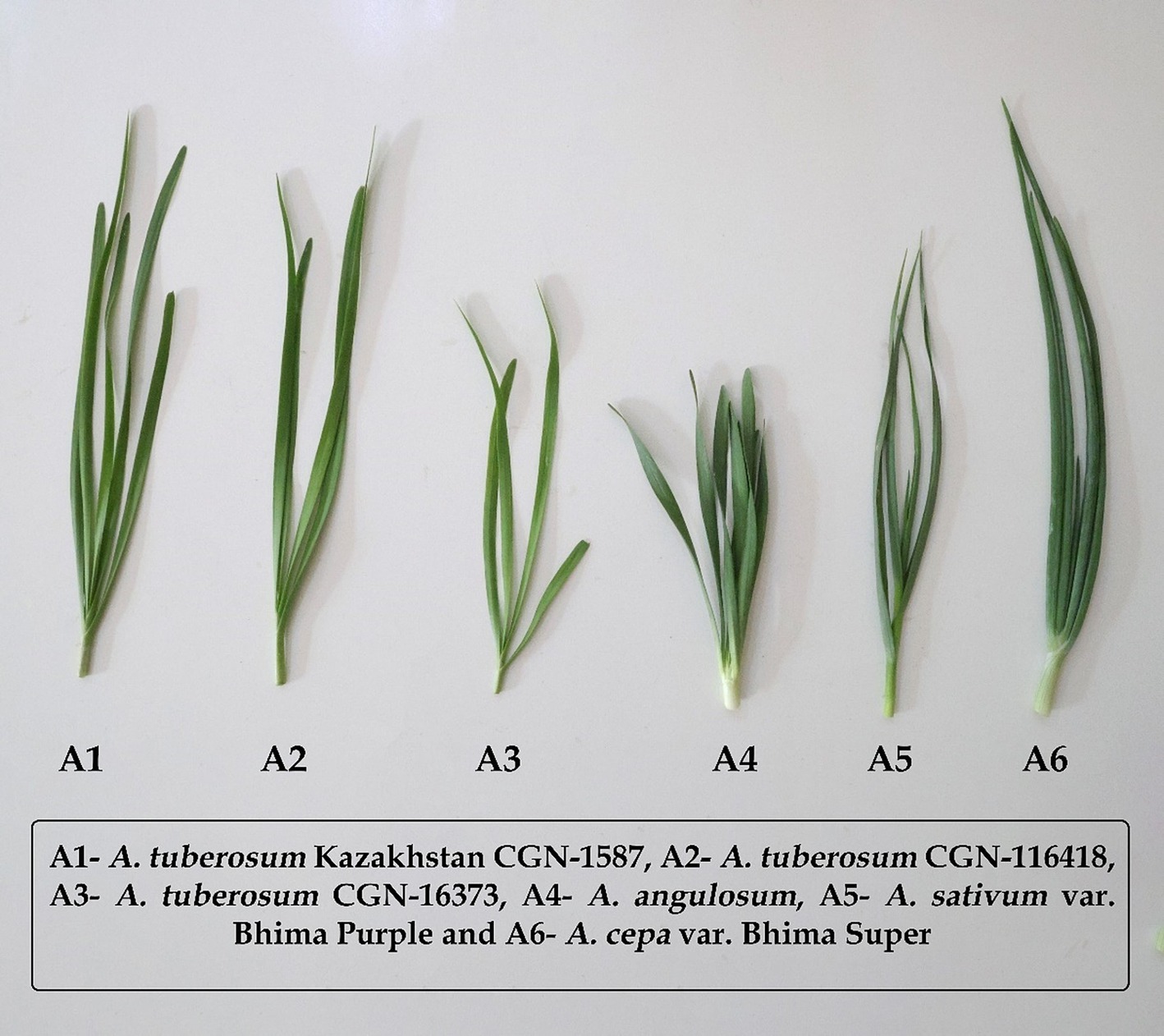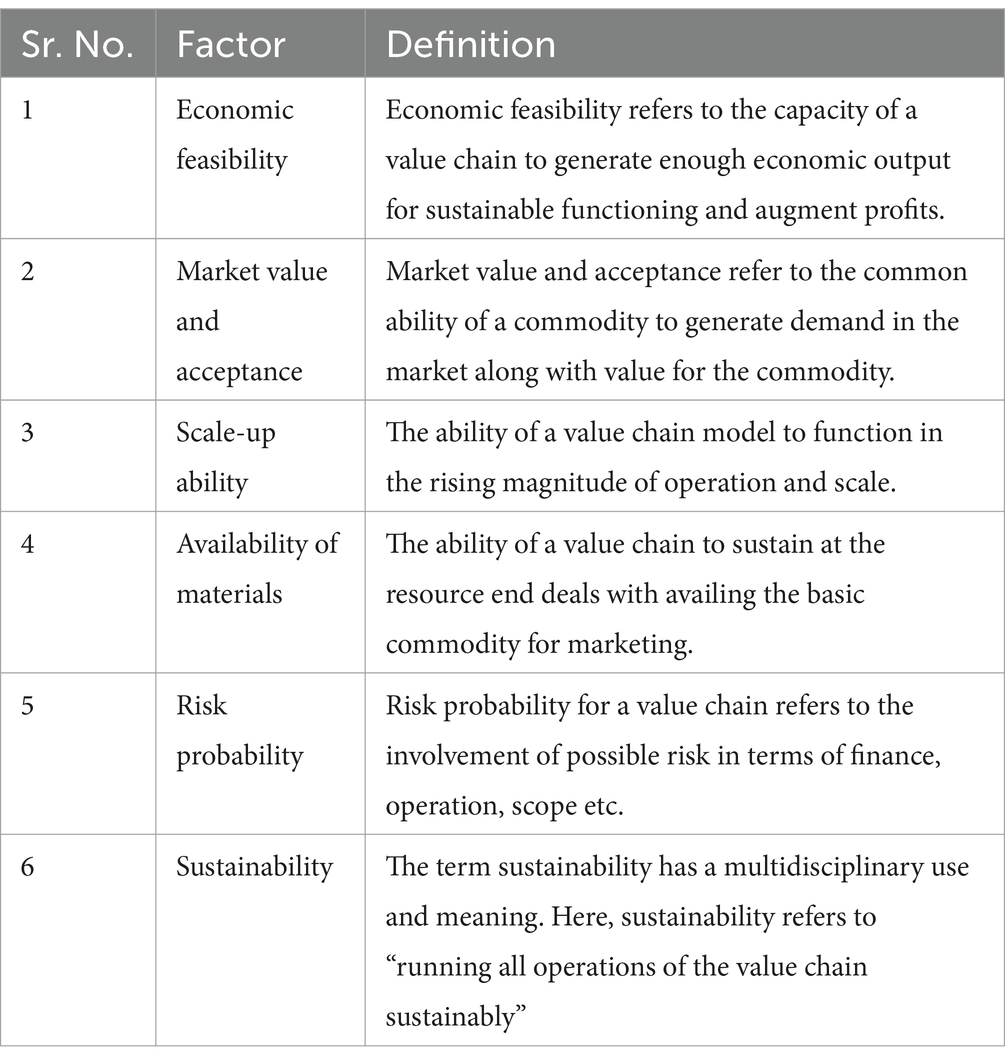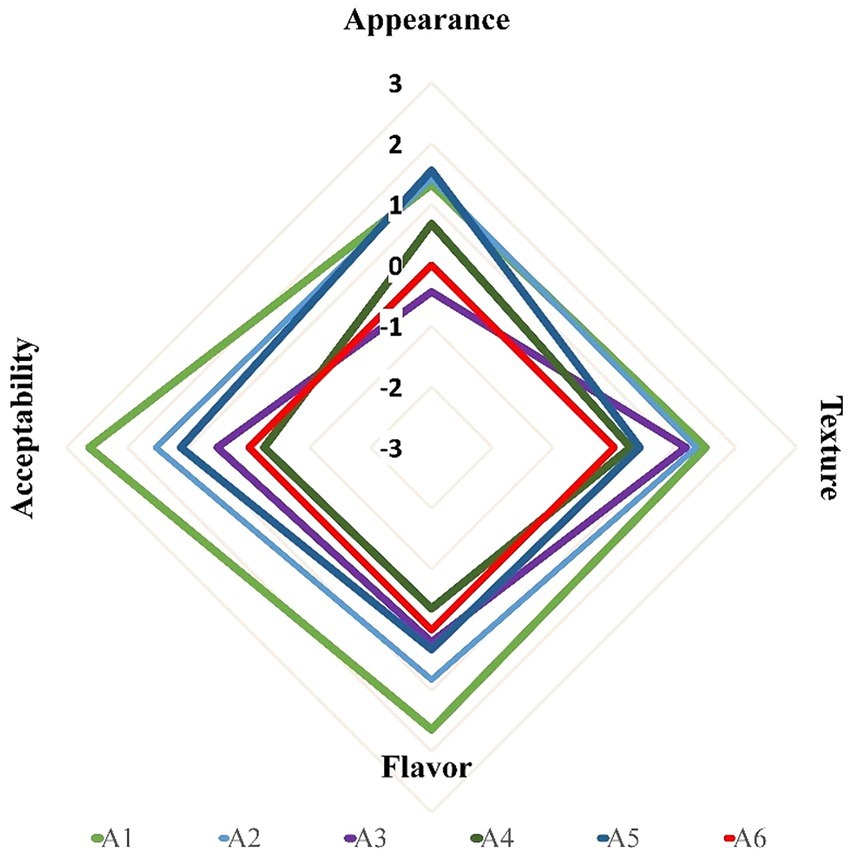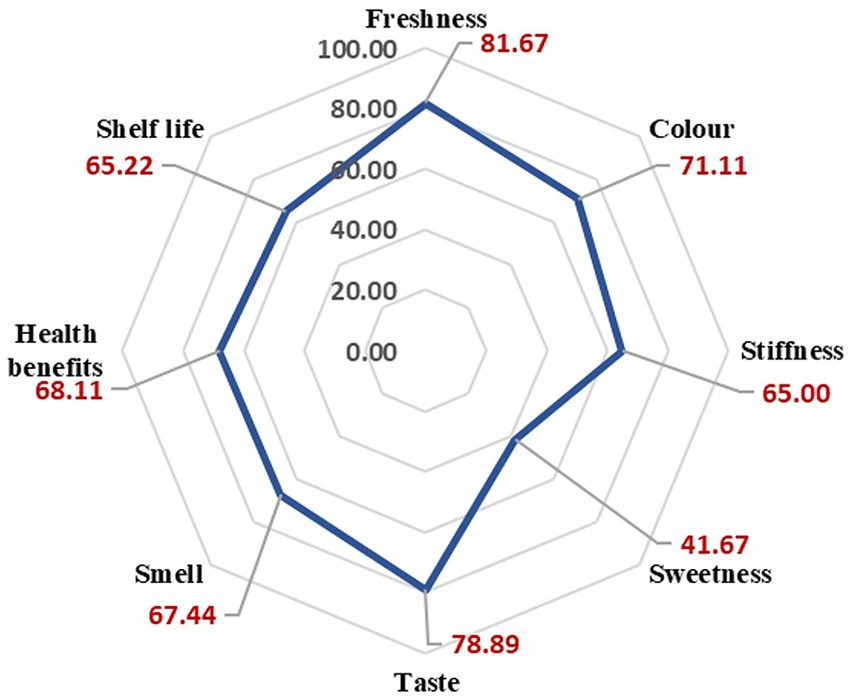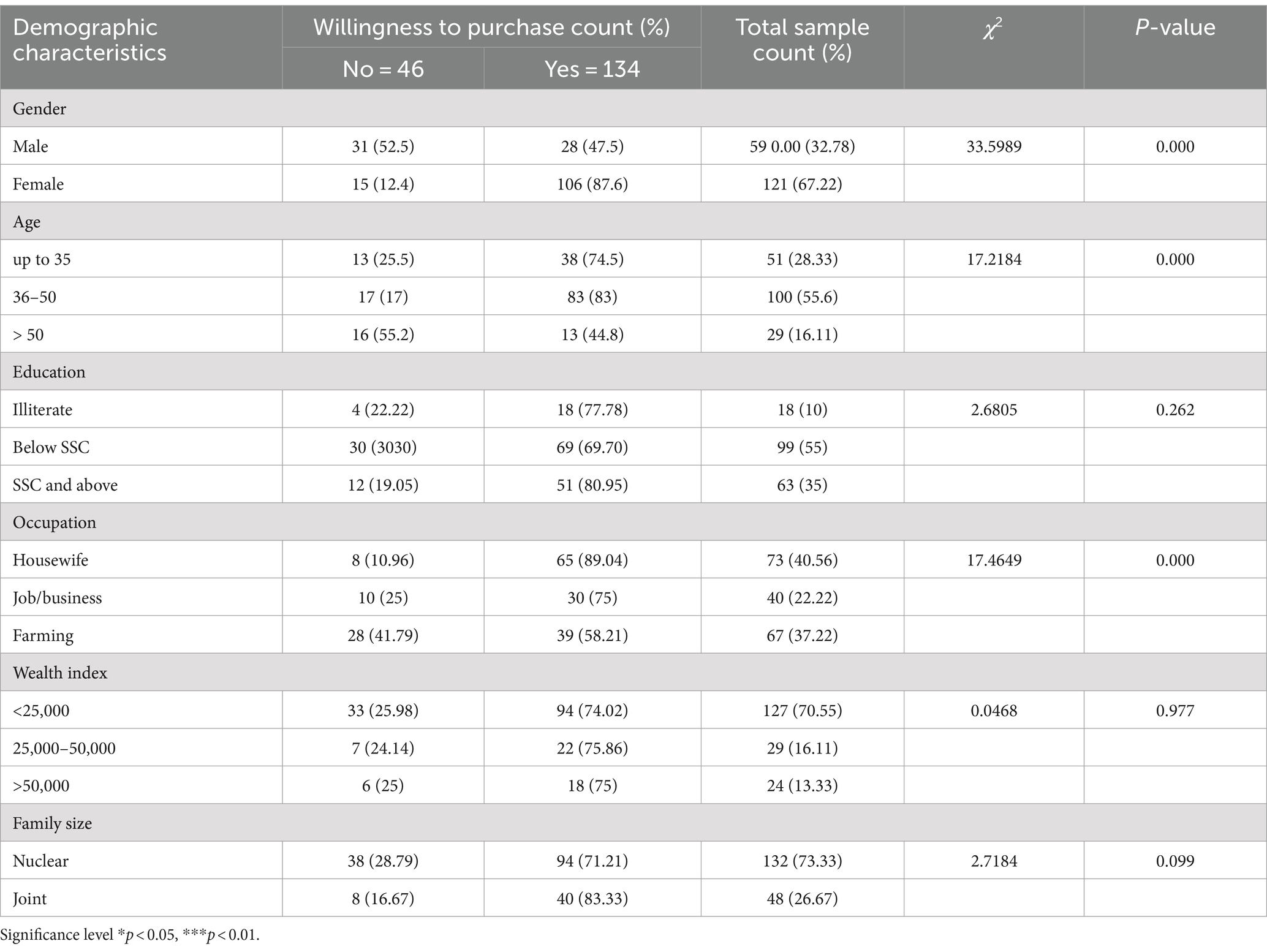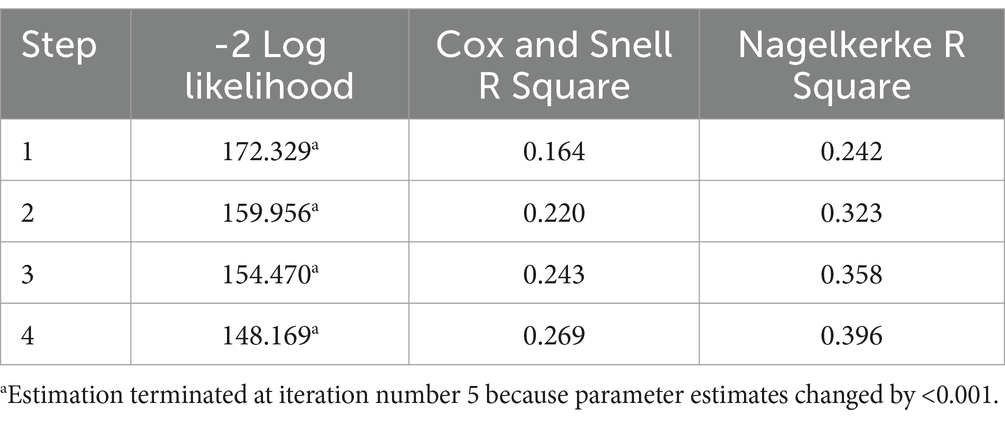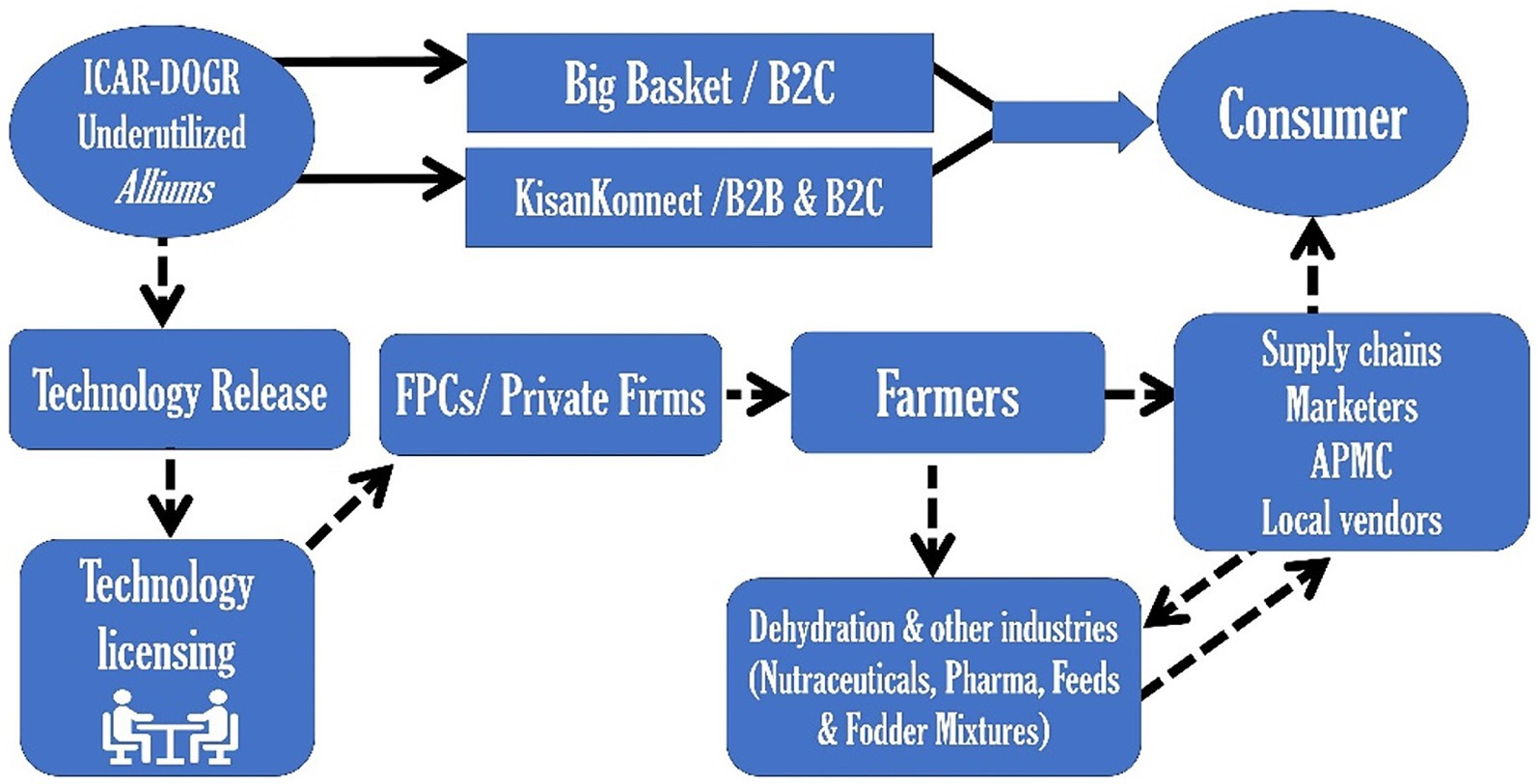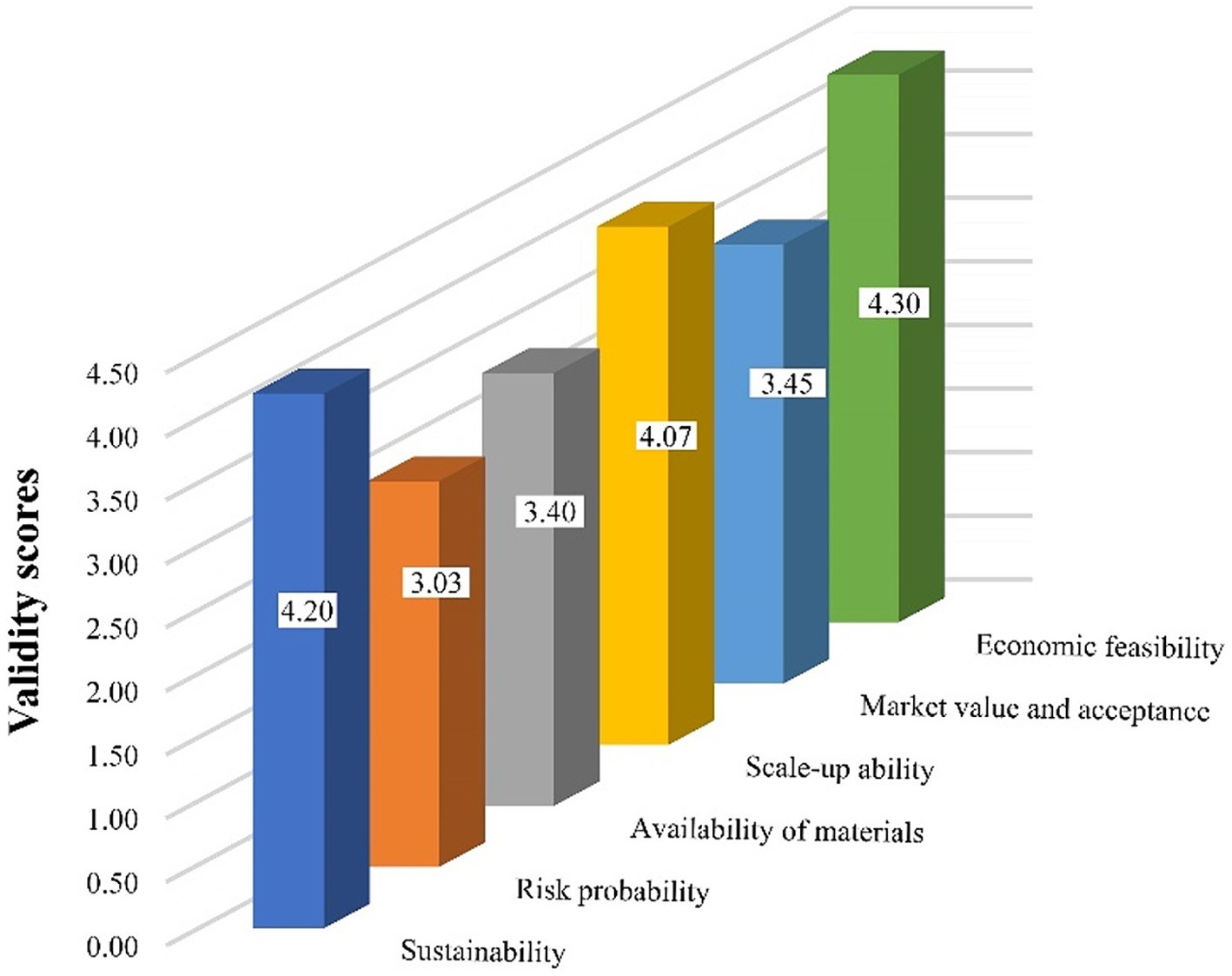- ICAR-Directorate of Onion and Garlic Research, Pune, India
The genus Allium is a prominent member of the Amaryllidaceae family and encompasses approximately 1,063 species worldwide. These diverse species vary in appearance and flavor but they share biochemical similarities. Underutilized Alliums present a promising alternative to onion and garlic in various Indian regions, given their adaptability, versatile utility, and nutraceutical properties. Their adaptation in the plains of India is a great opportunity to add medicinal and nutraceutical value to Indian cuisine. Therefore, the present study aimed to evaluate the underutilized raw Allium leaves for their sensory perception by hedonic test (n = 60), consumer perceptions and willingness to purchase (n = 180), and the development and validation of value chain model (n = 30) to popularize these species in plains. For the various sensory attributes evaluated, Allium tuberosum Kazakhstan CGN-1587 emerged out to be the most suitable for its advancement into the consumer survey. The consumer perception study recorded 74.44% willingness to purchase of total respondents and a majority preference for consuming it in cooked form (38.30%). A value chain model of Allium tuberosum Kazakhstan CGN-1587 with supply chain agencies was subsequently developed. Validation of this value chain model was done with a panel of different stakeholders. Panelists perceived the value chain as highly valid, particularly in terms of economic feasibility (4.30 ± 0.70) and sustainability (4.20 ± 0.81). Thus, the present study provides valuable insights that can support and promote the use of underutilized Alliums in non-traditional areas of India.
1 Introduction
The Allium genus encompasses a vast array of 1,063 species comprising cultivated, underutilized, wild and ornamental species, the majority of which are cultivated for dietary and medicinal purposes (Benke et al., 2021). The Allium species are indigenous to Afghanistan, China, Turkey, Iran, Korea, Japan, Russia, and Central Asia (Kotlińska et al., 1991), as well as the northeastern part of India and the western Himalayas. Among the Allium species prevalent in the Indian region, notable mentions include Allium cepa, Allium sativum, Allium chinense G. Don, Allium hookeri Thwaites, Allium tuberosum, and Allium fistulosum (Pandey et al., 2008). Apart from the widely accepted and utilized species A. cepa (onion) and A. sativum (garlic), other Allium species, like Allium ampeloprasum L. (leek), Allium fistulosum L. (scallion), Allium schoenoprasum L. (chives), Allium tuberosum Rottler (garlic chives), and Allium angulosum are grown on a limited area in various parts of the world and are less familiar or utilized in smaller quantities. However, these underutilized Allium species are noteworthy due to their significant commercial and nutritional value. These lesser-known Alliums possess considerable potential for utilization in research, industry, and consumption.
These underutilized Alliums that are not cultivated commercially on a larger scale or widely traded are lesser-known plant species but are well adapted to marginal and stress conditions. IPGRI commonly employs the terms “underutilized” and “neglected crops” to underscore two critical aspects defining the status of these species: the level of attention received from users and the extent of research and conservation efforts dedicated to them (IPGRI, 2002). Despite their underutilization, these Alliums have a rich history of consumption, with local communities residing in Western Himalaya and North East part of India (Verma et al., 2008; Pandey et al., 2014), who very well know about their nutritional and medicinal properties. These species collectively harbor over 260 phytoconstituents, predominantly volatile compounds including 63 organosulfur molecules, alongside saponins, flavonoids, anthocyanins, phenolic compounds, amino acids, organic acids, fatty acids, steroids, vitamins, and nucleosides (Alam et al., 2023). These Alliums are known to provide relief from various ailments such as asthma, diarrhea, cardiovascular issues, and also impotency (Zhong, 1985; Khalid et al., 2014). Despite their huge nutraceutical value, these Alliums remained underutilized and mostly cultivated and consumed in limited pockets of the country such as the Himalayan region, North East India (Pandey et al., 2014). Millions of people, particularly tribal and rural communities, still collect and consume a wide variety of such plants or crops to meet their food and nutritional requirements. The lack of awareness about the nutritional value of these crops is considered one of the major reasons behind their underutilization. This can be overcome by organizing awareness drives for farmers and consumers, networking for regular supply chain and developing value added products. Currently, there is limited information available on the perceived rationale for the usage of these local crops. Ongoing global research indicates that underutilized wild edible Alliums possess a huge potential for commercialization but remain neglected for a longer period. There is a pressing need to compile and disseminate knowledge about these underutilized Alliums to preserve cultural traditions and stimulate research into food history and novel food sources (Jena et al., 2018).
Underutilized Allium can also be utilized as a viable alternative for onion and garlic cultivation across various regions of India, particularly amidst the prevailing unpredictable climatic conditions (Vuković et al., 2023; Kurnia et al., 2021; Gohil and Kaul, 2016; Bede and Zaixiang, 2020). Therefore, efforts are needed to popularize the Alliums in non-traditional areas of the country. These efforts involve awareness programs, providing planting material and package of practices, studying consumer perception, and making easier availability of these Alliums through supply or value chain development.
The ICAR-Directorate of Onion and Garlic Research (ICAR-DOGR) maintains an extensive collection of Allium germplasm, comprising various Allium species which are actively being utilized in diverse research endeavors including hybridization, breeding, and trait characterization (Mahajan et al., 2017; Khandagale et al., 2022; Benke et al., 2024). Additionally, the institute is dedicated to promoting and popularizing the utilization of these Allium species beyond research purposes. This endeavor follows a systematic approach, beginning with the evaluation of Allium germplasm for their agronomic performance under Western Ghat conditions. Species showing promising agronomic traits are further being evaluated through sensory analysis and likeliness studies. Such studies serve as a foundation for the commercialization of the identified Allium species (Foroudi et al., 2023; Vermeir et al., 2023; Sridhar et al., 2023; Sinébou et al., 2023). Domestication and commercial cultivation of wild edible plants, such as wild Allium species, in India offer great potential for providing stable yields, and conserving agro-ecosystems.
Greens, generally referring to the tender leaf portions of vegetables, are rich in vitamins, minerals, and bioactive compounds, offering significant health benefits (Delgado et al., 2017). These traditional edible plants can be enjoyed in a variety of creative ways, such as raw in salads, boiled, or fried, and are often incorporated into various dishes (Carvalho and Morales, 2010). Farmers have successfully domesticated many wild and underutilized species, which are now cultivated globally for their exceptional taste and nutritional profile. Cultivating underutilized Allium plants using sustainable methods presents exciting market opportunities for small-scale farms. This approach not only supports the recovery of marginal lands but also enhances productivity. Further, the successful spread of these underutilized Alliums in non-traditional areas also needs to explore consumer acceptability and preferences for such products or vegetables. The likeliness of a vegetable is influenced by various factors such as taste, flavor, appearance, individual perceptions and assumptions (Hartwell et al., 2024; Tokat and Yilmaz, 2023). One of the popular methods for evaluating consumer preference is the hedonic test for sensory evaluation. This method is commonly employed in studies to formulate market strategies (Manfrin et al., 2023; Cassago et al., 2024) and aid in selecting the optimal product from a range of options (Roosen et al., 2023; Baune et al., 2023). The perceptions and preferences of consumers depend upon different factors like age, gender, education, occupation, marketing, culture, financial status, etc. (García-Barrón et al., 2024). Beyond consumer likeliness, the segmentation and marketing requirements of a product must be informed by insights into consumer relational or perceptual behavior (Babin and Harris, 2023; Franco Lucas et al., 2023; Cornelissen and Piqueras-Fiszman, 2023). By understanding consumer perception, relational aspects for qualities, usage methods, values and willingness, a robust commercialization strategy can be developed (Cornelissen and Piqueras-Fiszman, 2023). These insights generated from experimental studies were utilized to establish a supply or value chain for underutilized Alliums. Following the initiation of the value chain, a validation workshop was conducted to validate the model and devise improvement techniques. This study entails findings from these exploratory investigations.
2 Materials and methods
2.1 Allium species and their cultivation
The Allium greens selected for sensory and consumer response analyses were collected from ICAR-DOGR, Pune based on agronomic performance. Six Allium greens were included in the sensory analysis viz.; A. tuberosum Kazakhstan CGN-1587, A. tuberosum CGN-116418, A. tuberosum CGN-16373, Allium angulosum, A. sativum var. Bhima Purple and A. cepa var. Bhima Super (used as control) and referred to as A1, A2, A3, A4, A5, and A6 (Figure 1) respectively for convenience. The cultivation process strictly adhered to good agricultural practices and prohibited the use of pesticides. Underutilized Alliums (A1, A2, A3, and A4) were grown by transplanting mother tubers, while A. sativum var. Bhima Purple and A. cepa var. Bhima Super were cultivated using clove and seeding methods, respectively, in the experimental field of ICAR-DOGR. The present study was carried out in four phases as mentioned in the sections below.
2.2 Phase 1: sensory evaluation
In March 2021, sensory analysis was conducted at the ICAR-Directorate of Onion and Garlic Research in Pune, Maharashtra, India, preceded by a pre-test with 15 individuals to validate the research questionnaire (Fouladkhah et al., 2011). All Alliums were managed under uniform field conditions. Primarily the underutilized Allium species viz. A1, A2, A3, and A4 were selected based on their agronomical performance at Western Ghat’s condition. All greens, except A. sativum var. Bhima Purple and A. cepa var. Bhima Super, were harvested during the twelfth cutting, approximately 15 months post-cultivation. A. sativum var. Bhima Purple and A. cepa var. Bhima Super greens were 70 days old at the time of cutting. On evaluation day (same day of harvesting), leafy green samples were harvested by cutting them at ground level along with the stem. Samples were rinsed with tap water and immersed in sodium hypochlorite solution (200 ppm) for 15 min to sanitize them, and then they were again washed in running water. Washed samples were dried with a paper towel. Two to four fresh whole stems along with leaves of each Allium green to be evaluated were packed in a zip-locked bag coded with a random three-digit number and proceed for sensory analysis without the atmosphere modification within an hour.
Considering previous studies (Fouladkhah et al., 2011; Hough et al., 2006; Ares et al., 2014) for sample sufficiency, 60 consumer panelists for sensory analysis were selected. The panelists were divided into 10 groups of six members each. The working-class panelists habituated to e-markets were selected. The background profile of the panelists is given in Table 1. The sensory tests were executed on two distinct days, with five groups assessed per day during the forenoon. Panelists were deliberately kept uninformed regarding the sample’s usage and characteristics to mitigate potential biases. The assessment was done on a 9-point hedonic scale (Fouladkhah et al., 2011; Hough et al., 2006; Ares et al., 2014), encompassing attributes of appearance, flavor, texture, and overall acceptability. Anchors used in the hedonic scale were as follows: 1 = highly unacceptable, 2 = unacceptable, 3 = moderately unacceptable, 4 = slightly unacceptable, 5 = neither acceptable or unacceptable, 6 = slightly acceptable, 7 = moderately acceptable, 8 = acceptable, 9 = highly acceptable. Panelists were asked to taste a sample, score it, and then rinse the palate with distilled water and unsalted crackers before starting the next sample. A waiting time of 5 min was given before testing another sample. The room conditions of the sensory analysis laboratory were maintained at 24°C temperature. To minimize the positional bias during the evaluation, samples were assigned random three-digit codes and presented to panelists in random order. Each panelist was asked to describe the characteristics of each type of leafy Allium sample in words; these results were used for qualitative analyses.
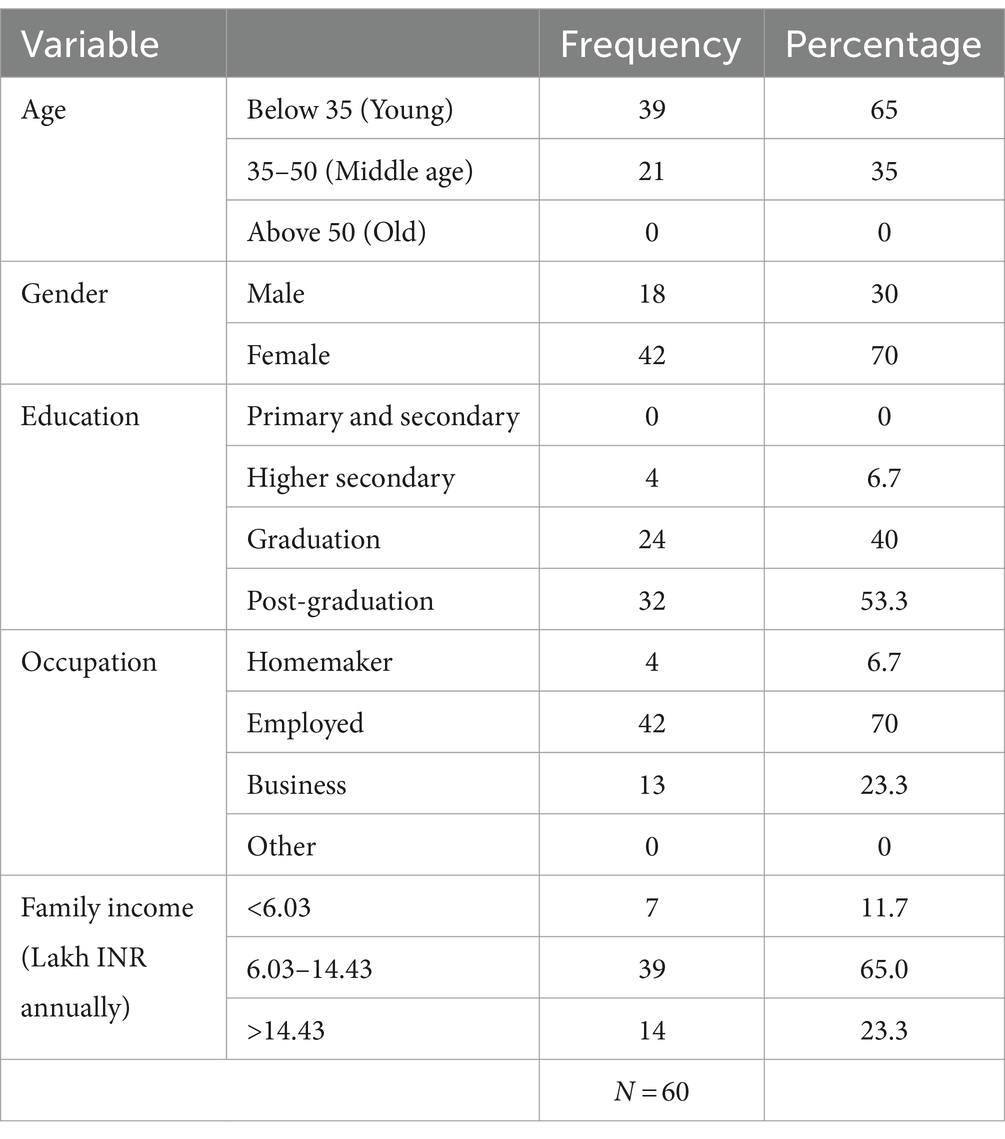
Table 1. The socio-economic profile of panelists who participated in the hedonic test of sensory analysis.
2.3 Phase 2: assessment of consumer perception and willingness to purchase
Following the sensory evaluation, based on the highest score for overall acceptability, the A1 (A. tuberosum Kazakhstan CGN-1587) was selected for assessing consumer responses. The study was carried out in Rajgurunagar and nearby towns. Rajgurunagar town is an urban settlement located on the bank of the Bhima River in the Pune district of Maharashtra, India. Bundles of 300 gm A1 greens were supplied to 180 randomly selected households thricely in March 2021. The participants’ consumption patterns and willingness to purchase A1 greens were assessed through multiple choice, Likert type and open-ended types of questions included in a structured interview schedule (Supplementary File 1) (Ndiaye et al., 2023; Castellari et al., 2019; Ali and Ali, 2020; Pappalardo et al., 2016). The multiple-choice question enabled us to determine the frequency of green Allium consumption in participant’s diets. In this question, Allium greens could be of any kind and possible responses were “a few times a year,” “once a month,” “two or three times a month” “once a week,” “multiple times a week,” and “Daily.” For the open-ended question, participants were asked to list ways of consuming the provided Allium green. From the Likert type-scale question, green Allium consumers’ likeliness to different possible consumption ways and the perception of quality were assessed. For the likeliness to different possible consumption ways, i.e., different preparations and forms of consumption, a 5-point Likert-type scale with potential responses being: “like a great deal,” “Like a moderate amount,” “Like a little,” “Neither like nor dislike,” “Dislike a little,” “Dislike a moderate amount,” “Dislike a great deal” was used. The participant’s willingness-to-purchase (WTP) for provided A1-greens was determined by questioning their willingness to purchase it. The question had the option of not purchasing either option. In the last part of the survey, participants were asked to complete a series of demographic questions. Demographic categories included age, gender, income, occupation, family size, and education.
2.4 Phase 3: development of value chain model
Following the assessment of consumer responses and market studies regarding willingness to purchase, an MOU (memorandum of understanding)/contract was made in June 2021 for the commercialization of A1 greens with KisanKonnect. It is a farmer-producer company (FPC) engaged in B2B and B2C supply of fresh vegetables. The value-added supply was made by cleaning, grading, sorting, and packing the greens in aerated polybags to enhance the shelf life before delivering them to the consumers. The backward chain operations of production and procurement to consumer delivery were managed by KisanKonnect. Additionally, another value chain with Big Basket Pvt. Ltd. for A1 greens in finger-length cut portions in prepacked form was also initiated in October 2022.
2.5 Phase 4: validation of model
Along with this existing model where ICAR-DOGR renders production, assessment, and monitoring operations and the supply chain partners involved in procurement to consumer logistics; another proposed model involving other possible stakeholders, operations and use flow was formulated to analyse its feasibility with the context. A one-day workshop was organized to validate the basic model. Different stakeholders (N = 30) including supply chain firms, dehydration industries, researchers, vegetable vendors, farmers and farmer producer companies (FPCs) participated in the workshop. After the presentation of the model and decisive discussions, the participants were provided with a structured questionnaire to evaluate the value chain model based on factors as described in Table 2. The questionnaire designed to validate the value chain model was based on Lagarda-Leyva et al. (2023) and the definitions of the factor on which a value chain is to be evaluated were slightly modified to make it relatable in the context. Responses were analyzed on a 5-point Likert scale where 5 = highly valid and 1 = least valid.
2.6 Statistical analysis
For the statistical analysis of the hedonic test for sensory evaluation, Microsoft Excel 2020 and SAS 9.2 (SAS Inc., Chicago, IL) were used in data management, descriptive and inferential statistical procedures. For descriptive statistics, the “COUNTIF” function of Excel 2020 was used to calculate the percentage of consumers rating the Allium greens as “acceptable and/or highly acceptable” and “unacceptable and/or highly unacceptable.” For qualitative analysis of open-ended questions, noted characteristics of the Allium greens were coded and grouped, and most noted attributes were reported with slight modification in wording. The least significant difference-based analysis of variance by Tukey’s HSD was used to compare the hedonic scores. As Tukey’s HSD procedure has a low rate of type I error for comparing a group of means with one group as a control, it was selected for this study (Fouladkhah et al., 2011; Dunnett, 1955; Lee and Lee, 2018). P-values smaller than 0.05 were considered as a significant difference among compared groups.
For the second phase study, i.e., consumer response studies, the data collected from respondents were analyzed by using descriptive statistics, cross-tabulation analysis and binary/stepwise logistic regression (Ndiaye et al., 2023; Castellari et al., 2019; Ali and Ali, 2020; Pappalardo et al., 2016) to systematically examine how willingness to purchase varies by different background characteristics such as gender, age, wealth index/monthly family income, occupation, and education level, family size. Forward stepwise Logistic regression was chosen as the analytical method due to the binary nature of the dependent variable (“willingness to purchase”). The logistic regression model is defined as:
Log (p/ (1 - p)) = β0 + β1X1 + β2X2 + … + βnXn.
where: p represents the probability of the dependent variable being 1 which indicates willingness to purchase.
X1, X2, …, Xn denote the independent variables. Here viz. age, gender, education, occupation, wealth index and family size.
β0, β1, β2, …, βn are the coefficients of the independent variables which are estimated during the model fitting process using maximum likelihood estimation.
The stepwise regression procedure began with an empty model. Predictors were iteratively added to the model one at a time based on their significance in predicting the dependent variable. At each step, the significance level for entry was evaluated (using a p-value threshold p > 0.05). The predictor with the lowest p-value below the threshold was added to the model, provided, it met the entry criteria. After all predictors were added, backward elimination was performed to refine the model. Non-significant predictors were identified by their p-values (p > 0.05). Predictors that did not contribute significantly to the model were removed one at a time, starting with the predictor with the highest p-value. This process continued until all remaining predictors in the model were statistically significant. The Wald statistic tests the null hypothesis that the coefficient of a predictor variable is equal to zero (i.e., it does not affect the outcome). It is calculated as the square of the coefficient estimate divided by its estimated variance. Large Wald statistics, relative to the degrees of freedom, indicate that the predictor variable is significantly associated with the outcome. The coefficient B represents the estimated effect of a predictor variable on the log-odds of the outcome variable. It indicates the change in the log-odds of the outcome variable associated with a one-unit change in the predictor variable, holding other variables constant. For example, an odds ratio of 1.5 means that for every one-unit increase in the predictor variable, the odds of the outcome variable occurring are 1.5 times higher.
Validation of value chain model was done by analysing the response from stakeholders on five point Likert scale, transforming them to an average linked with validation score along with standard deviation from the mean.
3 Results
3.1 The sensory evaluation
A sensory evaluation was conducted to investigate consumer preferences for six selected Allium greens. Panelists evaluated key sensory attributes – appearance, texture, flavor, and overall acceptability—to identify promising Allium lines for potential market introduction.
The results of the hedonic evaluation, summarized in Figure 2 and Table 3, revealed significant differences (p < 0.00) among the Allium species for all assessed sensory characteristics. This finding underscores the critical role of sensory attributes in shaping consumer preferences for Allium greens. ANOVA confirmed a statistically significant influence of visual appearance on overall acceptability (F = 10.12, p < 0.00), highlighting the importance of visual appeal for these products. Texture also emerged as a significant differentiator among the Allium greens (F = 6.49, p < 0.00). Post-hoc analysis using Tukey’s HSD test revealed that A. tuberosum Kazakhstan CGN-1587 (A1) exhibited a distinct textural profile (mean score = 6.85) compared to the other varieties. Flavor followed a similar trend, with statistically significant variations observed among the species (F = 7.27, p < 0.00). Notably, A1 received a significantly higher mean score for flavor compared to the other evaluated Allium greens. The overall acceptability of the Allium greens, as measured by the hedonic scale, also showed significant differences among the species (F = 16.65, p < 0.00). A1 and A. tuberosum CGN-16418 (A2) emerged as frontrunners, receiving significantly higher acceptability scores compared to the other species. This finding suggests that A1 and A2 possess superior overall palatability characteristics.

Table 3. Mean scores associated with the Allium greens evaluated on the Hedonic scales compared by Tukey HSD test (mean ± SD).*
Table 4 provides further insights into consumer preferences by presenting the percentage of panelists who ranked the greens in the most and least favorable hedonic categories. While A2 received slightly higher scores for appearance and texture, A1 was categorized as acceptable or highly acceptable for its flavor by the majority of panelists. Notably, for overall acceptability, 70.00% of panelists perceived A1 as acceptable or highly acceptable, significantly exceeding the positive ratings received by the other Allium greens. The sensory evaluation, through its descriptive and statistical analysis of key sensory attributes, provided valuable insights into consumer preferences for the tested Allium greens. The findings highlight distinct sensory characteristics and consumer preferences among the tested Allium varieties.
Allium tuberosum Kazakhstan CGN-1587 (A1) emerged as the most promising candidate for market introduction based on its sensory attributes. A1 received significantly higher scores (p < 0.05) for overall acceptability and flavor compared to the control and other evaluated Allium greens. Additionally, A1 demonstrated a statistically significant difference for all sensory attributes when compared to the control group. Panelists described A1 favorably, noting its appealing visual appearance, satisfyingly chewy texture, mild pungency, light aftertaste, and pleasant garlic-like flavor. These characteristics suggest A1’s potential for consumer appeal and differentiation within the Allium greens market.
Allium tuberosum CGN-16418 (A2) also displayed promising sensory attributes. While A2 exhibited significantly higher scores for appearance, texture, and overall acceptability compared to the control, its flavor profile did not differ significantly from the control (p > 0.05). Similar to A1, panelists noted a chewy texture and a mild garlic-like flavor profile for A2. These findings suggest A2’s potential acceptability but highlight the need for further exploration of flavor differentiation strategies.
Allium tuberosum CGN-16373 (A3) received a higher score for texture compared to the control (p < 0.05) but was ranked lower for appearance. There were no significant differences observed between A3 and the control for flavor and overall acceptability (p > 0.05). Panelists described A3 as having a chewy texture, with a mild garlic-like flavor profile accompanied by a grassy aftertaste. While A3 possesses some favorable attributes, the grassy aftertaste may require further investigation to determine its impact on consumer preference.
A. angulosum (A4) received the lowest scores for all four sensory attributes compared to the control group. There was no statistically significant difference observed between A4 and the control for any attribute. Panelists noted A4’s appealing appearance and chewy texture but also reported a strong onion-garlic flavor with an astringent and bitter aftertaste. These characteristics suggest that A4, in its current form, may not be as readily accepted by consumers due to its intense flavor profile.
A. sativum var. Bhima Purple (A5) served as a reference point for garlic-related sensory attributes. This variety received the highest score for appearance among all evaluated Allium greens (p < 0.05). However, there were no significant differences observed between A5 and the control for texture and flavor. Panelists described A5 as having an attractive appearance, a crispy texture, and a mild garlic flavor with a slightly astringent aftertaste.
A. cepa var. Bhima Super (A6), a common onion variety, served as a control in the sensory analysis. This inclusion reflects the competitive landscape that underutilized Allium greens face in the market. A6 was noted to have characteristically strong pungency, astringent aftertaste, and long-lasting aftertaste, along with a crunchy texture.
In conclusion, the sensory evaluation revealed distinct characteristics among the evaluated Allium greens. A1 (A. tuberosum Kazakhstan CGN-1587) stands out for its appealing visual attributes, desirable texture, and mild garlic-like flavor profile, suggesting its potential for consumer acceptance and market introduction. Further research may be warranted to explore flavor optimization strategies for A2 and investigate methods to mitigate the grassy aftertaste observed in A3. A4’s strong flavor profile may require additional exploration to determine its market suitability. This study contributes valuable insights into the sensory profiles of underutilized Allium greens, informing product development efforts to expand consumer options within the Allium green category and the potential breeding programs where these perceptions can be utilized as breedings goals or criterias for selection.
3.2 The consumption pattern, quality perception, and likeliness of consumers
This section delves into consumer behavior toward Allium greens, with a particular focus on the newly introduced A. tuberosum Kazakhstan CGN-1587 (A1). The study revealed a generally infrequent consumption pattern for Allium greens in general. Participants responded to a question “How often do you consume Allium greens of any kind?” Most respondents (36.67%) reported they consume Allium greens a few times a year, 21.67% stated they consume once a month and 22.78% multiple times a month, 5.56% multiple times per week and only 1.67% reported consumption of Allium greens daily.
When asked to prioritize factors influencing their perception of Allium green quality (Figure 3), consumers overwhelmingly ranked freshness as the most important attribute (81.67%). Followed by freshness of A1 greens, taste (78.89), color (71.11) and health benefits (68.11) were considered. This emphasizes the importance of maintaining freshness throughout the supply chain for the successful introduction of A1.
Participants were given A1 greens and instructed to prepare them using various methods. The most popular preparation methods recorded were pakoras (fried fritters) at 62.78% and cooked sabzi (vegetable dish) at 46.67%. These findings provide valuable insights into potential consumer preferences for incorporating A1 into their culinary repertoire. Following the initial survey on A1 preferences, participants received additional information about the greens, including their origin, basic uses, and health benefits. Interestingly, even with this information, the majority of respondents (38.20%) still preferred to have A1 greens in cooked dishes (Figure 4). This suggests a potential bias toward familiar cooking methods used for similar vegetables like green onions. Additionally, the data may hint at a gender influence, with a higher proportion of female respondents, who are presumably home cooks, favoring cooked preparations. Products in the fried forms recorded a 35% frequency of likeliness to have it in a moderate amount. A strong dislike was recorded about the use of greens for other products such as Manchurian bolls, pickles, chutney, etc. followed by the raw salad forms.
3.3 Willingness to purchase
The socio-economic profiles of respondents, encompassing gender, age, education, occupation, family size, and wealth index, exert notable influence on their inclination toward purchasing decisions (Table 5). The chi-square analysis revealed statistically significant associations (p < 0.05) between purchase intent and gender, age, and occupation. Among the 180 respondents, a considerably higher proportion of females (87.6%) expressed interest in purchasing A1 compared to males (47.5%). Respondents in middle and young age groups exhibited the strongest purchase intent (83 and 74%, respectively), whereas older adults demonstrated a lower level of enthusiasm. Interestingly, housewives reported the highest willingness to purchase A1. Furthermore, respondents with higher secondary education or above displayed a greater likelihood to consider buying A1 compared to those with lower education levels.
Stepwise binary logistic regression was applied for further confirmation of the conclusions regarding the effect of background characteristics on willingness to purchase A1 greens. The log-likelihood value decreases with each step, indicating an improvement in model fit. The Cox and Snell R square and Nagelkerke R square values increase progressively, suggesting an enhancement in the explanatory power of the model. The model summary of the analysis is shown in Table 6.
The forward LR method of stepwise logistic regression selects significant predictor variables from a set of independent variables. Table 7 shows that the variables such as gender, age, education, and family size included in the final model demonstrate a significant impact on model fit. The statistical significance of independent variables in the logistic regression model was tested by the Wald test. Variables like gender, age, and family size show statistical significance (p < 0.05) concerning willingness to purchase. Conversely, variables such as occupation, monthly income, and education lack statistical significance (p > 0.05) regarding willingness to purchase. In step 1 of the estimation of stepwise logistic regression categorical variable gender was added as covariate. Females exhibit a significantly higher likelihood (7.82 times) of willingness to purchase A1 greens compared to males (p < 0.001).
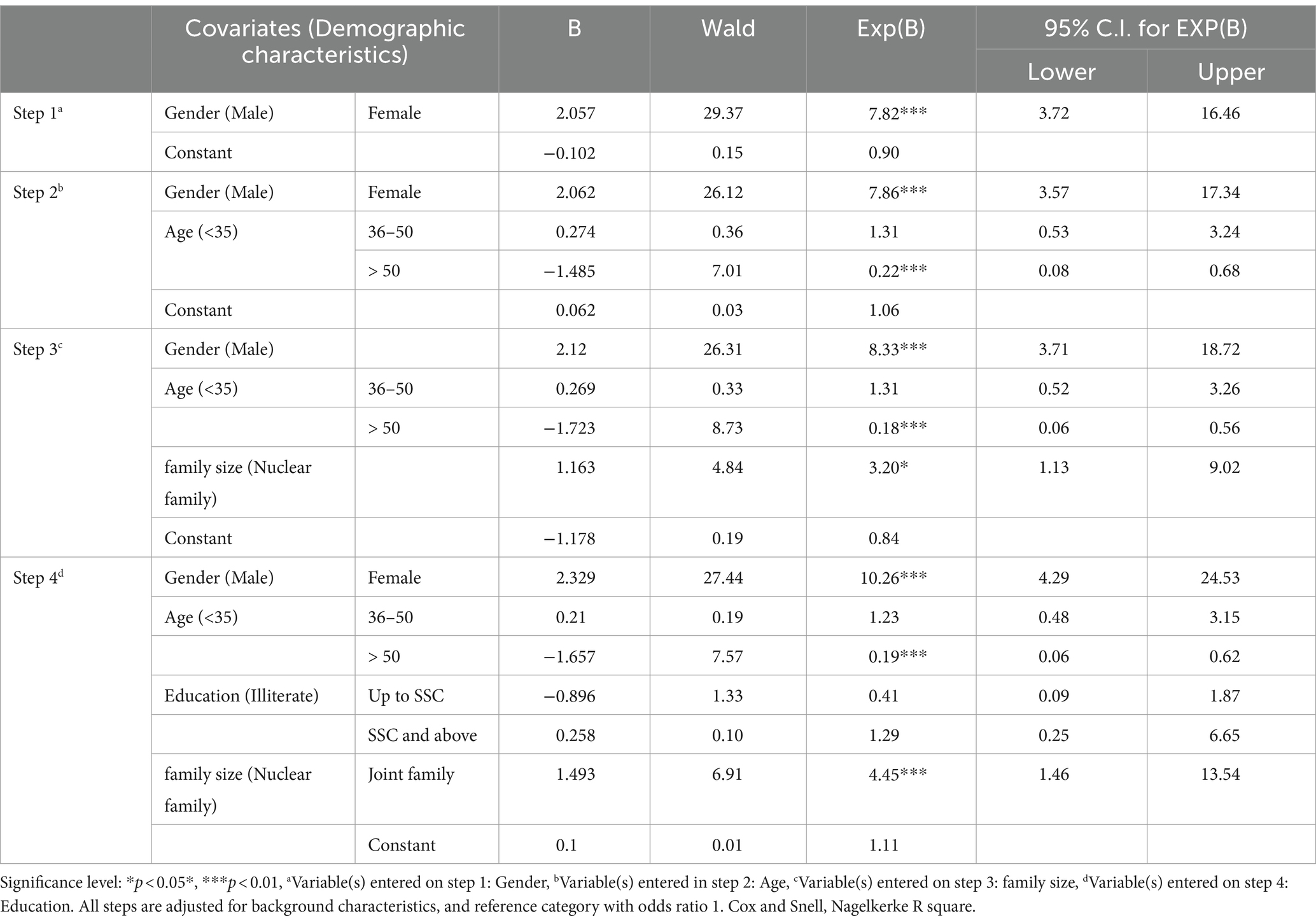
Table 7. Stepwise logistic regression, forward LR method for factor influencing willingness to purchase of A. tuberosum Kazakhstan-CGN-1587 greens.
In step 2, respondents aged over 50 years are less likely to express willingness to purchase A1 chives compared to younger individuals (p < 0.001). In step 3 family size is added as covariates with nuclear family as a reference category. Those from joint families demonstrate significantly higher odds (3.20 times) of willingness to purchase A1 greens compared to respondents from nuclear families (p < 0.05). Further, in step 4, education level does not significantly influence the willingness to purchase AT1 chives, as indicated by non-significant associations with outcome variables.
3.4 The validation of the value chain model
The development efforts focused on a value chain featuring graded, sorted, and pre-packaged aerated packets of A1 greens. This approach yielded a positive market response, with average monthly demand increasing by 1.5-fold between July 2021 and June 2023. The findings from previous consumer perception surveys were instrumental in formulating key marketing strategies, including customer acquisition, market segmentation, and product positioning.
In tandem with the general value chain framework, a scalable model was formulated for further evaluation (Figure 5). This model’s validation process considered critical factors such as economic feasibility, market value and acceptance, scalability, material availability, risk probability, and sustainability. Validation panelists rated the value chain model highly valid across all factors, with economic feasibility receiving the highest score (4.30 ± 0.70) (Figure 6). Sustainability also emerged as a significant strength, with a validation score of 4.20 ± 0.81. Regarding scalability, panelists identified the release of related technology bundles as the most crucial factor. This bundle would encompass production practices for underutilized Alliums, along with relevant value chain studies conducted by ICAR-DOGR. Widespread dissemination of this information was viewed as essential for strengthening the production cycle and improving material availability. Additionally, licensing the technology bundle (including varieties, production techniques, and valuable value chain research) to organized entities like farmer producer companies or value/supply chain firms was considered a strategy to enhance scalability (score: 4.07 ± 0.78). This approach would not only facilitate competition across the production-to-procurement and procurement-to-consumer value chains but also potentially expand A1’s utilization in alternative value chains such as dehydration, animal feed production, and nutraceutical development.
The risk probability of the value chain model received a moderate validation score (3.03 ± 1.16), indicating that panelists perceived the model as generally robust. Importantly, none of the validation factors received a score suggesting “very low validity.” The positive market response to A1 and the successful validation of the proposed value chain model suggest its potential for successful commercialization. The model’s focus on economic feasibility, sustainability, and scalability positions it for long-term viability. Dissemination of production technologies and strategic partnerships with established entities are key considerations for future endeavors.
4 Discussion
The findings of our study underscore the pivotal role of sensory characteristics and visual appeal in shaping the overall acceptability of Allium greens. The comparison of scores received by the greens compared to the control reveals that A1 and A2 exhibited significantly higher mean scores compared to A3, A4, and the control A6, indicating a superior visual appeal. This is consistent with the well-documented notion that the appearance of food products has a profound influence on consumer choices (Lawless and Heymann, 2010; Caracciolo et al., 2020a). Furthermore, the distinctive flavor profile of A1 greens distinguishes it from the other species under study, with the hedonic test highlighting its appealing sensory attributes. The study’s findings resonate with previous research emphasizing the significant influence of bitterness and astringency on consumer preferences for vegetables (Xiao et al., 2015; Senevirathne et al., 2019; Caracciolo et al., 2020b). In the study many panelists identified bitterness, strong pungency, and enduring aftertaste in samples A4 and A6, leading to lower acceptance due to heightened levels of astringency and bitterness. In contrast, samples A1 and A2, characterized by milder flavor profiles and lower bitterness and pungency, were favored by the panelists.
The increasing emphasis on healthier lifestyles has led to heightened consumer interest in healthy foods (Caracciolo et al., 2019). The majority of the respondents in the second phase study considered the consumption influenced by the perceived health benefits of greens. In this context, Allium greens emerge as an ideal vegetable for meeting consumer demands for healthier eating, transcending their sensory and biochemical characteristics. Notably, the Allium greens utilized in the present study were cultivated without synthetic agrochemicals, showcasing a potential permaculture approach to agronomy. Effectively communicating these attributes to consumers can significantly enhance the market success of Allium greens (Caracciolo et al., 2020a). Additionally, the lesser frequency of Allium greens in consumption by the respondents can be associated with the seasonal availability of common Allium greens and their prejudices about flavor profiles. For the quality perception of the respondents about the Allium greens studied, the freshness was one of the most perceived quality characteristics reflecting the consumers’ decision to buy the product. The prejudiced uses that are commonly known to respondents were depicted in their use pattern for provided A1 green samples when not guided by any prior information. Whereas after the provision of information related to the importance of A1 greens and available options to use most of the respondents recorded a higher likeliness to have the greens in cooked form. This points out the necessity of conveying the importance and several base use patterns for introducing new vegetable greens in the market.
Several studies have consistently demonstrated the significant impact of demographic variables and socio-economic profiles, on both attitude formation and purchasing behavior (Herath et al., 2008; Bogue et al., 2005; Anttolainen et al., 2001; Niva, 2006; Rezai et al., 2012). Similarly, the present study corroborates these findings, revealing that the socio-economic profiles of respondents, encompassing gender, age, education, occupation, family size, and wealth index, exert a notable influence on their inclination toward purchasing decisions. Among the 180 respondents, the higher proportion of females (87.6%) showing willingness to purchase as compared to males (47.5%) is in line with many previous studies which reported that females tend to have a higher rate of acceptance compared to males (Siró et al., 2008; Urala, 2005). This depicts a positive market potential as the dominant presence of females in the cooking activities in the studied area is showing more willingness to purchase A1 greens.
Further, the forward LR method of stepwise logistic regression showed that variables such as gender, age, education, and family size were included in the final model, demonstrating a significant impact on model fit. This could be attributed to differences in culinary preferences, health consciousness, or cultural factors influencing food choices among genders. Supply chain agencies and marketers targeting female consumers can adapt their marketing strategies to highlight the unique qualities and benefits of these chives that appeal to this gender. Older individuals may follow more traditional culinary habits or may be less inclined to experiment with new or unfamiliar vegetables than younger respondents. In the marketing strategies to appeal to older consumers, educational campaigns or cooking demonstrations showcasing the usefulness and health benefits of A1 greens could be beneficial. Joint families may prioritize communal meals and larger quantities of ingredients, leading to a greater demand for versatile and flavorful ingredients like A1 greens. Businesses can target marketing efforts toward households with multiple family members, emphasizing the value and versatility of A1 greens in family cooking. The lack of significant association with education in step 4 suggests that A1 greens appeal to a broad demographic range, regardless of educational background and depicts that education has no bearing on acceptance (Chambers and Lobb, 2007; Chambers et al., 2008).
All criteria used for the validation of the value chain model show scores (>3), indicating an inclination toward the validity of the judgment criteria. Further, the consideration of value chain models valid in terms of economic feasibility and suitability provides the soundness of the results procured in previous phases of the study to augment strategies like customer augmentation, market segmentation and product positioning. Overall, these phase-wise studies provide bases on which the businesses can be developed with targeted marketing strategies to effectively reach and engage specific demographic segments, thereby tapping the market potential for A1 greens.
5 Conclusion
The sensory analysis of the identified Allium greens gathers key considerations about given sensory attributes and regarding the positioning of the studied greens for further popularization. For the overall likeness, hedonic scores of the four identified Allium greens were higher over the control. The best-scored line in sensory analysis, i.e., A. tuberosum Kazakhstan-CGN-1587 (A1) was used for further popularization efforts. The consumer perception survey opens up the important consumer view. The freshness as the foremost reason for likeliness, the most likeliness for a cooked form of use points out the key areas a value chain should focus on while operating a value chain based upon A. tuberosum Kazakhstan-CGN-1587 (A1) greens. Further, the association of background characteristics with willingness to purchase also figures out the females and mid-age category (35–50) consumers as key customer segments to focus on. The experimental value chain model and its validation underline its validity in terms of sustainability for the value chain engaging A. tuberosum Kazakhstan-CGN-1587 as a commodity. The validation of the value chain model suggests its potential for successful commercialization. A strong research and strategic partnerships can contribute to scaling up production, expansion and ensuring efficient supply chains for success of A. tuberosum Kazakhstan-CGN-1587 in the market. Further research can investigate the nutritional composition of different Allium greens and their bioactive compounds and health benefits. Looking to the price volatility issue of fresh onions in Indian market, governments can implement policies to promote the cultivation, consumption, and export of Allium greens. Public awareness campaigns can be launched to educate consumers about the nutritional benefits, culinary uses, and sensory characteristics of Allium greens.
Data availability statement
The original contributions presented in the study are included in the article/Supplementary material, further inquiries can be directed to the corresponding author.
Ethics statement
Ethical review and approval was not required for the study on human participants in accordance with the local legislation and institutional requirements. Written informed consent from the (patients/participants or patients/participants legal guardian/next of kin) was not required to participate in this study in accordance with the national legislation and the institutional requirements.
Author contributions
RK: Conceptualization, Funding acquisition, Methodology, Project administration, Resources, Supervision, Writing – original draft, Writing – review & editing. AG: Data curation, Formal analysis, Investigation, Methodology, Writing – original draft. SG: Supervision, Writing – original draft. SYG: Methodology, Visualization, Writing – original draft. SS: Methodology, Writing – original draft. KK: Writing – original draft, Writing – review & editing. RB: Writing – original draft. SW: Formal analysis, Software, Writing – original draft. VM: Funding acquisition, Resources, Writing – original draft.
Funding
The author(s) declare that financial support was received for the research, authorship, and/or publication of this article. This work was financially supported by the ICAR-Directorate of Onion and Garlic Research, Pune, India.
Acknowledgments
The authors also acknowledge the help of Dr. Vishal Thorat, Navsari Agriculture University, Navsari in carrying out statistical analysis.
Conflict of interest
The authors declare that the research was conducted in the absence of any commercial or financial relationships that could be construed as a potential conflict of interest.
Publisher’s note
All claims expressed in this article are solely those of the authors and do not necessarily represent those of their affiliated organizations, or those of the publisher, the editors and the reviewers. Any product that may be evaluated in this article, or claim that may be made by its manufacturer, is not guaranteed or endorsed by the publisher.
Supplementary material
The Supplementary material for this article can be found online at: https://www.frontiersin.org/articles/10.3389/fsufs.2024.1427167/full#supplementary-material
References
Alam, A., Al Arif Jahan, A., Bari, M. S., Khandokar, L., Mahmud, M. H., Junaid, M., et al. (2023). Allium vegetables: traditional uses, phyto constituents, and beneficial effects in inflammation and cancer. Crit. Rev. Food Sci. Nutr. 63, 6580–6614. doi: 10.1080/10408398.2022.2036094
Ali, T., and Ali, J. (2020). Factors affecting the consumers’ willingness to pay for health and wellness food products. J. Agric. Food Res. 2:100076. doi: 10.1016/j.jafr.2020.100076
Anttolainen, M., Luoto, R., Uutela, A., Blot, W. J., McLaughlin, J. K., and Puska, P. (2001). Characteristics of users and nonusers of plant stanol ester margarine in Finland: an approach to study functional foods. J. Am. Diet. Assoc. 101, 1365–1368. doi: 10.1016/S0002-8223(01)00327-3
Ares, G., Tárrega, A., Izquierdo, L., and Jaeger, S. R. (2014). Investigation of the number of consumers necessary to obtain stable sample and descriptor configurations from check-all-that-apply (CATA) questions. Food Qual. Prefer. 31, 135–141. doi: 10.1016/j.foodqual.2013.08.012
Baune, M. C., Broucke, K., Ebert, S., Gibis, M., Weiss, J., Enneking, U., et al. (2023). Meat hybrids–an assessment of sensorial aspects, consumer acceptance, and nutritional properties. Front. Nutr. 10:1101479. doi: 10.3389/fnut.2023.1101479
Bede, D., and Zaixiang, L. (2020). Dietary polysaccharides from Allium species: a critical review in dietary polysaccharides from Allium species: extraction, characterization, bioactivity, and potential utilization. Acta Sci. Agric 4, 1–15. doi: 10.31080/ASAG.2020.04.0780
Benke, A. P., Krishna, R., Mahajan, V., Ansari, W. A., Gupta, A. J., Khar, A., et al. (2021). Genetic diversity of Indian garlic core germplasm using agro-biochemical traits and SRAP markers. Saudi J. Biol. Sci. 28, 4833–4844. doi: 10.1016/j.sjbs.2021.05.013
Benke, A. P., Mahajan, V., and Mokat, D. N. (2024). Morphological and molecular diversity of some locally grown, underutilized and cultivated Allium species from India. Genet. Resour. Crop Evol.. doi: 10.1007/s10722-024-01965-w
Bogue, J., Coleman, T., and Sorenson, D. (2005). Determinants of consumers' dietary behaviour for health-enhancing foods. Br. Food J. 107, 4–16. doi: 10.1108/00070700510573168
Caracciolo, F., Cavallo, C., Del Giudice, T., Panico, T., Vecchio, R., and Cicia, G. (2020b). Consumers (dis) preference for bitterness in extra virgin olive oil: a field experiment. Int. J. Food Syst. Dyn. 11, 14–25. doi: 10.3390/nu11051164
Caracciolo, F., El-Nakhel, C., Raimondo, M., Kyriacou, M. C., Cembalo, L., De Pascale, S., et al. (2020a). Sensory attributes and consumer acceptability of 12 microgreens species. Agronomy 10:1043. doi: 10.3390/agronomy10071043
Caracciolo, F., Vecchio, R., Lerro, M., Migliore, G., Schifani, G., and Cembalo, L. (2019). Natural versus enriched food: evidence from a laboratory experiment with chewing gum. Food Res. Int. 122, 87–95. doi: 10.1016/j.foodres.2019.03.069
Carvalho, A. M., and Morales, R. (2010). Persistence of wild food and wild medicinal plant knowledge in a northeastern region of Portugal. Ethnobot. New Europe People Health Wild Plant Res. 12, 147–171. doi: 10.2307/j.ctt9qcqq3.12
Cassago, A. L. L., Artêncio, M. M., Contin, D. R., de Souza, B. C., Dias, G. S., Neto, L. G., et al. (2024). The impact of hop origin information on the sensory and hedonic evaluation of highly involved consumers of craft beer. Int. J. Wine Bus. Res. 36, 166–183. doi: 10.1108/IJWBR-02-2023-0010
Castellari, E., Ricci, E. C., Stranieri, S., Marette, S., Sarnataro, M., and Soregaroli, C. (2019). Relationships between health and environmental information on the willingness to pay for functional foods: the case of a new aloe vera based product. Nutrients 11:2781. doi: 10.3390/nu11112781
Chambers, S., and Lobb, A. (2007). “Consumer acceptance of functional foods: Soft fruit and lamb” in Developments in science and health claims, ILSI international symposium on functional foods in Europe. Brussels, Belgium.
Chambers, S., Lobb, A., Butler, L. T., and Traill, W. B. (2008). The influence of age and gender on food choice: a focus group exploration. Int. J. Consum. Stud. 32, 356–365. doi: 10.1111/j.1470-6431.2007.00642.x
Cornelissen, K., and Piqueras-Fiszman, B. (2023). Consumers’ perception of cultured meat relative to other meat alternatives and meat itself: a segmentation study. J. Food Sci. 88, A91–A105. doi: 10.1111/1750-3841.16372
Delgado, A. M., Vaz Almeida, M. D., Parisi, S., Delgado, A. M., Parisi, S., and Vaz Almeida, M. D. (2017). Greens and other vegetable foods. Chem. Mediterranean Diet 12, 59–137. doi: 10.1007/978-3-319-29370-7_5
Dunnett, C. W. (1955). A multiple comparison procedure for comparing several treatments with a control. J. Am. Stat. Assoc. 50, 1096–1121. doi: 10.1080/01621459.1955.10501294
Foroudi, P., Marvi, R., Cuomo, M. T., Bagozzi, R., Dennis, C., and Jannelli, R. (2023). Consumer perceptions of sustainable development goals: conceptualization, measurement and contingent effects. Br. J. Manag. 34, 1157–1183. doi: 10.1111/1467-8551.12637
Fouladkhah, A., Bunning, M., Stone, M., Stushnoff, C., Stonaker, F., and Kendall, P. (2011). Consumer hedonic evaluation of eight fresh specialty leafy greens and their relationship to instrumental quality attributes and indicators of secondary metabolites. J. Sens. Stud. 26, 175–183. doi: 10.1111/j.1745-459X.2011.00334.x
Franco Lucas, B., Götze, F., Vieira Costa, J. A., and Brunner, T. A. (2023). Consumer perception toward “superfoods”: a segmentation study. J. Int. Food Agribus. Mark. 35, 603–621. doi: 10.1080/08974438.2022.2044955
García-Barrón, S. E., Romero-Medina, A., Chombo-Morales, P., and Villanueva-Rodríguez, S. (2024). Structural analysis of whey representation between rural and urban populations in western Mexico. Food Res. Int. 182:114162. doi: 10.1016/j.foodres.2024.114162
Gohil, R. N., and Kaul, V. (2016). Overview of progress and potentials of improving commonly used Allium species in India. Gene Pool Diversity Crop Imp. 10, 325–365. doi: 10.1007/978-3-319-27096-8_11
Hartwell, H., Bray, J., Lavrushkina, N., Lacey, J., Rodrigues, V. M., Fernandes, A. C., et al. (2024). Identifying key factors that encourage vegetable intake by young adults: using the health belief model. Br. Food J. 126, 453–470. doi: 10.1108/BFJ-10-2022-0905
Herath, D., Cranfield, J., and Henson, S. (2008). Who consumes functional foods and nutraceuticals in Canada? Results of cluster analysis of the 2006 survey of Canadians’ demand for food products supporting health and wellness. Appetite 51, 256–265. doi: 10.1016/j.appet.2008.02.018
Hough, G., Wakeling, I., Mucci, A., Chambers, E. IV, Gallardo, I. M., and Alves, L. R. (2006). Number of consumers necessary for sensory acceptability tests. Food Qual. Prefer. 17, 522–526. doi: 10.1016/j.foodqual.2005.07.002
IPGRI (2002). Neglected and underutilized plant species: Strategic action plan of the international plant genetic resources institute. Rome: IPGRI.
Jena, A. K., Deuri, R., Sharma, P., and Singh, S. P. (2018). Underutilized vegetable crops and their importance. J. Pharm. Phytochem. 7, 402–407.
Khalid, N., Ahmed, I., Latif, M. S. Z., Rafique, T., and Fawad, S. A. (2014). Comparison of antimicrobial activity, phytochemical profile and minerals composition of garlic Allium sativum and Allium tuberosum. J. Korean Soc. Appl. Biol. Chem. 57, 311–317. doi: 10.1007/s13765-014-4021-4
Khandagale, K., Roylawar, P., Randive, P., Karuppaiah, V., Soumia, P. S., Shirsat, D., et al. (2022). Isolation and expression profiling of insecticidal lectins from wild alliums against onion Thrips (Thrips tabaci Lindeman). Proce. Nat. Acad. Sci. B Biol. Sci. 92, 451–459. doi: 10.1007/s40011-022-01360-4
Kotlińska, T., Havranek, P., Navratill, M., Gerasimova, L., Pimakhov, A., and Neikov, S. (1991). Collecting onion, garlic and wild species of Allium in Central Asia, USSR. FAO/IBPGR Plant Genetic Resources Newsletter, 83184, 31–32.
Kurnia, D., Ajiati, D., Heliawati, L., and Sumiarsa, D. (2021). Antioxidant properties and structure-antioxidant activity relationship of Allium species leaves. Molecules 26:7175. doi: 10.3390/molecules26237175
Lagarda-Leyva, E. A., Bueno-Solano, A., and Vega-Telles, E. A. (2023). “Strategy in supply chain and logistic ecosystems in megaregion Sonora-Arizona” in Supply chain management strategies and methodologies: Experiences from Latin America. eds. J. L. G. Alcaraz, D. F. M. Duque, and R. G. González-Ramírez (Cham: springer International Publishing), 451–476.
Lawless, H. T., and Heymann, H. (2010). Sensory evaluation of food: Principles and practices. Cham: Springer Science & Business Media.
Lee, S., and Lee, D. K. (2018). What is the proper way to apply the multiple comparison test? Korean J. Anesthesiol. 71, 353–360. doi: 10.4097/kja.d.18.00242
Mahajan, V., Benke, A., Gupta, A. J., and Singh, M. (2017). Garlic (A. sativum L.) research in India. Progress. Hortic. 49, 101–112. doi: 10.5958/2249-5258.2017.00024.0
Manfrin, A. M., Cassago, A. L. L., da Silva, R. K., Carvalho, F. M., Da Costa, F. B., Rocha, M. T. L., et al. (2023). The impact of coffee origin information on sensory and hedonic judgment of fine Amazonian robusta coffee. J. Sens. Stud. 38:e12827. doi: 10.1111/joss.12827
Ndiaye, O., Hedrick, V. E., Neill, C. L., Carneiro, R. C., Huang, H., Fernandez-Fraguas, C., et al. (2023). Consumer responses and willingness-to-pay for hibiscus products: a preliminary study. Front. Sust. Food Syst. 7:1039203. doi: 10.3389/fsufs.2023.1039203
Niva, M. (2006). Can we predict who adopts health-promoting foods? Users of functional foods in Finland. Scandinavian. J. Food Nutr. 50, 13–24. doi: 10.1080/11026480600655378
Pandey, A., Pandey, R., Negi, K. S., and Radhamani, J. (2008). Realizing value of genetic resources of Allium in India. Genet. Resour. Crop. Evol. 55, 985–994. doi: 10.1007/s10722-008-9305-2
Pandey, A., Pradheep, K., and Gupta, R. (2014). Chinese chives (Allium tuberosum Rottler ex Sprengel): a home garden species or a commercial crop in India. Genet. Resour. Crop. Evol. 61, 1433–1440. doi: 10.1007/s10722-014-0144-z
Pappalardo, G., Carnemolla, T. M., and La Via, G. (2016). Factors affecting purchasing process of functional foods. CAL 17:229. doi: 10.1186/s40100-018-0111-7
Rezai, G., Teng, P. K., Mohamed, Z., and Shamsudin, M. N. (2012). Functional food knowledge and perceptions among young consumers in Malaysia. Int. J. Econ. Manage. Eng. 6, 307–312. Available at: https://api.semanticscholar.org/CorpusID:35730153
Roosen, J., Neubig, C. M., Staudigel, M., and Agovi, H. (2023). Product appeal, sensory perception and consumer demand. Eur. Rev. Agric. Econ. 50, 1338–1363. doi: 10.1093/erae/jbad020
Senevirathne, G. I., Gama-Arachchige, N. S., and Karunaratne, A. M. (2019). Germination, harvesting stage, antioxidant activity and consumer acceptance of ten microgreens. Ceylon J. Sci 48, 91–4038. doi: 10.4038/cjs.v48i1.7593
Sinébou, V. C., Togbé, E. C., Ezin, A., Ahohouendo, A. F., Ahohuendo, B. C., and Jacquemart, A. L. (2023). Toward the reshaping of an endogenous leafy vegetable value chain: the case study of Vitex doniana in the Republic of Benin. Econ. Bot. 77, 455–475. doi: 10.1007/s12231-023-09591-w
Siró, I., Kápolna, E., Kápolna, B., and Lugasi, A. (2008). Functional food. Product development, marketing and consumer acceptance—a review. Appetite 51, 456–467. doi: 10.1016/j.appet.2008.05.060
Sridhar, K., Bouhallab, S., Croguennec, T., Renard, D., and Lechevalier, V. (2023). Recent trends in design of healthier plant-based alternatives: nutritional profile, gastrointestinal digestion, and consumer perception. Crit. Rev. Food Sci. Nutr. 63, 10483–10498. doi: 10.1080/10408398.2022.2081666
Tokat, P., and Yilmaz, I. (2023). Neurogastronomy: factors affecting the taste perception of food. Int. J. Gastr. Res. 2, 1–10. doi: 10.56479/ayed.2022.10261
Urala, N. (2005). Functional foods in Finland: Consumers' views, attitudes and willingness to use (Doctoral dissertation. Helsinki: Helsingin yliopisto.
Verma, V. D., Pradheep, K., Khar, A., Negi, K. S., and Rana, J. C. (2008). Collection and characterization of Allium species from Himachal Pradesh. Indian J. Plant Genet. Res. 21, 225–228.
Vermeir, I., Petrescu, D. C., and Petrescu-Mag, R. M. (2023). What are the ‘shape friendly’ locations to sell misshapen tomatoes? The effect of point of purchase on consumers’ abnormality perception and probability to buy. Food Qual. Prefer. 106:104809. doi: 10.1016/j.foodqual.2023.104809
Vuković, S., Popović-Djordjević, J. B., Kostić, A. Ž., Pantelić, N. D., Srećković, N., Akram, M., et al. (2023). Allium species in the Balkan region—major metabolites, antioxidant and antimicrobial properties. Horticulturae 9:408. doi: 10.3390/horticulturae9030408
Xiao, Z., Lester, G. E., Park, E., Saftner, R. A., Luo, Y., and Wang, Q. (2015). Evaluation and correlation of sensory attributes and chemical compositions of emerging fresh produce: microgreens. Postharvest Biol. Technol. 110, 140–148. doi: 10.1016/j.postharvbio.2015.07.021
Keywords: sensory properties, hedonic test, willingness to purchase, value chain, validation
Citation: Kale RB, Gavhane AD, Gadge SS, Gaikwad SY, Singh S, Khandagale KS, Bhat R, Wayal SM and Mahajan V (2024) From field to fork: revitalizing underutilized alliums through value chain development. Front. Sustain. Food Syst. 8:1427167. doi: 10.3389/fsufs.2024.1427167
Edited by:
Priyanka Lal, Lovely Professional University, IndiaReviewed by:
Sangappa Sangappa, ICAR-Indian Institute of Millets Research (IIMR), IndiaAtheequlla GA, Indian Institute of Horticultural Research (ICAR), India
Copyright © 2024 Kale, Gavhane, Gadge, Gaikwad, Singh, Khandagale, Bhat, Wayal and Mahajan. This is an open-access article distributed under the terms of the Creative Commons Attribution License (CC BY). The use, distribution or reproduction in other forums is permitted, provided the original author(s) and the copyright owner(s) are credited and that the original publication in this journal is cited, in accordance with accepted academic practice. No use, distribution or reproduction is permitted which does not comply with these terms.
*Correspondence: Rajiv B. Kale, cmFqaXYua2FsZUBpY2FyLmdvdi5pbg==; Vijay Mahajan, dmlqYXkubWFoYWphbkBpY2FyLmdvdi5pbg==
 Rajiv B. Kale
Rajiv B. Kale Abhishek D. Gavhane
Abhishek D. Gavhane Shailendra S. Gadge
Shailendra S. Gadge Shivam Y. Gaikwad
Shivam Y. Gaikwad Kiran S. Khandagale
Kiran S. Khandagale